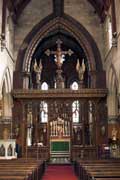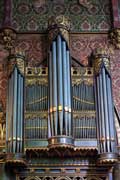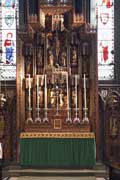| |

St Barnabas, Pimlico


Chancel organ case
St Barnabas, Pimlico


High altar
St Barnabas, Pimlico
|
As with most of my music, ideas had been percolating
in my imagination for years. Could I create a Suite of pieces based on
the eight Gregorian Psalm Tones? Summer brought inspiration, and the
composing started on July 16 2012, with the usual frenzy and disruption
to the rest of my life. This
creative whirlwind even manifests itself in my dreams and sleep patterns.
I had a concert in Derby to work for, but the composing went on till
the
last minute and resumed the moment I got home again. The distress caused
by a blocked ear and resulting deafness on one side influenced the mood
of
one of the movements.
I compose at the chamber organ and immediately write the notes down in
Braille music, albeit in rough draft form. By October 4, I had basically
written the whole Suite, and grabbed the chance to make a ragged but valuable
recording of the pieces on the 28th of that month at Alexandra Palace,
while practising for a concert.
Over ensuing months, listening to this recording and thinking constantly
about the music, I effected various revisions, tweaks and amendments. Making
the last of these on March 5 2013, I somehow knew that it was the final
adjustment. Gradually, I wrote out revised Braille versions of all
eight pieces.
In April I started recording myself dictating this new composition. Seated
at the piano, I dictate from my Braille score, naming and playing each
note.
I tried to attach these recordings to e-mails, sent to Ian Phillips-Kerr,
my transcriber in Newcastle. However, it emerged that these dictation sound
files were too large to go via e-mail. Ian gave me an alternative
e-address to send them to, but this also failed. My own computer seized
up
with increasing problems until it almost crashed! Ian started the
transcription work on April 22.
Next, Les Ames helped me burn three CDs containing my dictation of the
first four pieces, and we posted these to Ian. Eventually, Ian and I decided
that I should download all my remaining dictation sound files onto a memory
stick and send it to him through the post. We had a terrible set-back on
May 7, when Les and I accidentally erased four days’ worth of dictation!
Indeed, this disaster threw me into a temporary depression, until I rallied
and resolved to get on with re-dictating those four remaining pieces,
but even better than before!
On May 28 the memory stick was sent to Ian and he laboured hard on transcribing
all my notes onto his marvellous Sibelius software.
This
yields musical scores of superb quality, and of course editing is as easy
as
word processing. What is more, Sibelius can produce a computer
playback
of the notes, admittedly rather electronic-sounding, but ideal for me to
check the pitches, durations etc. Ian sent me these Sibelius playbacks
on a memory stick, but it was in an advanced format which my computer could
not open, - yet another hitch!
Ian patiently re-recorded the entire Sibelius playback in accessible format
on another memory stick, from which I was able to make all the aural corrections.
There were countless phone calls between us, to discuss accidentals, layout,
page-turns, registrations and other fine details of presentation. Whilst
rehearsing at Bloomsbury Baptist Church for a concert in June, I again
took the opportunity of recording the pieces, which greatly helped to refine
the registrations.
On June 18 I received from Ian the first proofs of the score, an exciting
moment! My musician friend Francis Marchal came over on July 4 for the
afternoon, to proofread and check the score with me. He took the ‘manuscript’ away
with him to peruse and edit in pencil. Ben Costello has similarly proofread
many of my other compositions, which sometimes involves sending the ‘manuscript’ between
Newcastle and London several times. Ian
was booked to go on holiday to Austria from July 17 till September. Since
I keenly wanted to have the finished score in time for the Suite’s
premiere
on September 2, it was vital to complete the proofreading before Ian’s
departure. He received the corrected proofs from Francis on July 11.
After further phone consultations, I took delivery of the finished master
copy on July 16, precisely one year since I started composing, and just
before Ian left for Austria. I then had the help of Andrew Beaizley to
produce the copies for distribution and to be available at the performances
in September.
Paradoxically, my previous composition, ‘Sharounag’ Op20,
was still not ready for distribution at this point. Because it is based
on Armenian
themes, I needed to get permission from the copyright holders, which process
added the best part of another year to its preparation!
Although the whole Suite project cost me approximately £750 and so
much effort, it is worth every penny, as my spasmodic composing is more
important to me than anything else. The muse rarely descends on me, but
when it
does, my inspiration and conviction burn bright!
© David Aprahamian Liddle - August 2013
|
|

